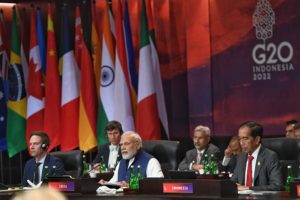Covid-19 crisis will hit ‘digital dinosaur’ B2B firms hard
Dr Venkatesh (Venky) Shankar, Professor of Marketing and Coleman Chair in Marketing and Director of Research at the Center for Retailing Studies, Mays Business School, Texas A&M University, suggests a three-pronged strategy for B2B firms post-COVID – navigate the turbulent present, prepare for recovery in the immediate future, and position for the long-term new normal.
According to him, winners in the post-COVID era will be firms with a clear strategy for the three phases outlined earlier, exhibiting digitally savviness and nimble responsiveness. Digital Darwinism will weed out the weak and propel the pioneers in the B2B space.

IBT: How has COVID-19 changed the business landscape and client expectations for B2B firms in your view in domestic and global markets?
Dr Venkatesh Shankar: COVID-19 has disrupted the business landscape and reshaped B2B client expectations the world over (domestic and global). Smarting under profitability pressure, clients are looking more for efficiency and cost control and are prepared to interact and leverage digital channels more. A McKinsey & Co survey shows that some B2B firms see digital channels as two to three times more important post COVID-19 compared to traditional channels. The digital channel is becoming the primary go-to-market channel for B2B firms.
B2B eCommerce revenues are surging. In fact, Amazon Business, the B2B arm of Amazon, is predicted to be the largest industrial distributor by 2021. Self-service technologies, in particular, mobile apps, are becoming more commonplace. The changes in the B2B landscape have different implications for tech-companies and non-tech companies in meeting their clients’ needs. Tech-companies are rapidly accelerating technology use in client relationships, in particular, with regard to digital channels. Non-tech B2B companies are also moving many aspects of their business to the digital medium to be closer to their clients. However, there is much more heterogeneity across tech companies in digital adoption than that among non-tech companies.
IBT: In what ways does this landscape change expectations from the marketing teams of such companies and how could this reallocate marketing budgets?
Dr Venkatesh Shankar: There has been a rationalization and streamlining of marketing budgets. Pre-COVID-19, a firm’s marketing spend was based on one long-term strategy. Now, B2B firms need to have three strategies: navigate the turbulent present, prepare for recovery in the immediate future, and position for the long-term new normal.
Accordingly, marketing teams have to plan for and work with flexible marketing budgets. Many B2B firms that typically relied on trade shows and events will now slash those expenditures, as in-person events are being minimized. By some estimates, about a quarter of the companies have started redirecting their budgets to emerging opportunities such as direct sales through digital channels, technology services and consulting services.
In the post COVID-19 economy, B2B firms will increasingly market hybrid bundles, comprising goods and services. Rather than have fixed long-term spending strategies in place, companies are now reallocating their budgets to be more agile and resilient than before. They will also have to allocate marketing budgets toward the community and society. For example, medical equipment firms and automobile firms had to produce personal protective equipment and ventilators and communicate their purpose to their customers and other stakeholders.
IBT: Marketing professionals are compelled to embrace digital engagement due to travel bans across the world and major business events/conferences getting cancelled/postponed. What constraints does this forced shift place on customer networking and engagement, and what benefits does it offer? Do you expect this to permanently shift some aspects of customer engagement to the online mode? Why or why not?
Dr Venkatesh Shankar: Today, almost all B2B businesses have embraced digital communication both within and across firms. First, the proverbial handshake between vendors and clients has disappeared as COVID-19 rampages through the world. Second, Zoom meetings have replaced in-person meetings. Third, salesforces have started using analytics and AI tools much more than before. These shifts will make B2B firms more productive in their marketing and sales efforts.
However, buyer-seller relationships will take a whole new turn. Pre-COVID-19, B2B success hinged on trusted personal relationships. Now, B2B firms will have to build strong relationships with their clients with diminished personal contact.
One way through which B2B firms can build trust with their buyers in the enhanced online world is by leveraging the transparency and efficiency of the digital channel. Chatbots and digital assistants can help in the prospecting, negotiating, and servicing stages of the B2B sales cycle. AI will continue to enhance B2B marketing and selling. However, B2B clients still expect to call or video interface a human if they have key questions and service issues. Thus, human audio and video relationships will assume greater importance than before. B2B firms will have to strike a good balance between personal and technological interactions and manage them by key accounts.
IBT: The salesforce has a major role to play in the customer outreach and engagement strategy of a B2B marketer. With rising adoption of digital channels, are some sales roles in B2B organisations under threat?
Dr Venkatesh Shankar: Sales organizations were already undergoing changes with greater digital content and delivery in their efforts. Covid-19 has hastened the transition to digitalization and the use of digital channels. The number of physical salesforce has dwindled, but the role of sales force has morphed into that of a consultant and facilitator from an aggressive lead pursuer and closer.
With the decline in demand and sales in many sectors during these challenging times, B2B firms have had to furlough or layoff a significant number of sales people in many industries, in particular, retail, travel, transportation, and tourism. With the closure of many stores and the move toward contactless interactions, the role of sales associates in stores has practically vanished. These sales associates will have to use tools such as video chats and augmented reality (AR) to be relevant in a social distanced environment. In general, the use of AI will gain more traction in B2B firms.
IBT: Also, as the digital space becomes more crowded, how can B2B brands stand out in terms of content approach, strategy, use of influencers, targeting, etc?
Dr Venkatesh Shankar: As the digital space is getting crowded, the need for differentiation for B2B brands has never been more important. Clearly defining the value proposition and delivering customer value by leveraging digital channels is key. There is a race among B2B firms to be digitally available and efficient to their clients.
However, digital competency will become a given, so B2B brands will have to rise beyond that to differentiate themselves. They will have to anticipate and solve customer problems through empathy, problem solving, and solution selling. Zoom is a fine example of a video conferencing service that catapulted in popularity after Covid-19. It vaulted ahead of competitors like Skype, Microsoft Teams, and Cisco Webex mainly because it was more customer-centric, its service was more intuitive and robust, and it invested in brand building through differentiated media like outdoor and in-stadia billboards.
IBT: Harvard Business Review research estimates from an analysis of past recessions that 17% of companies didn’t survive, 80% hadn’t regained their pre-recession growth rate over three years while only 9% flourished (outperforming competitors by at least 10% in revenue and profit growth). What characteristics will separate the winners in the post-COVID period in your opinion in the B2B marketing space?
Dr Venkatesh Shankar: Winners from the Covid-19 apocalypse will be firms with a clear strategy for the three phases outlined earlier, exhibiting digitally savviness and nimble responsiveness. Digital Darwinism will weed out the weak and propel the pioneers in the B2B space. Just like the Covid-19 virus, which strikes those most vulnerable in their health, the Covid-19 crisis will hit digital dinosaur firms hard.
IBT: How will the pandemic change approach of B2B companies towards hiring young marketing talent in your opinion? What kind of skills could be in greater demand? Will contractual employment or gig economy rise? Please elaborate.
Dr Venkatesh Shankar: The pandemic has already changed the make-up of B2B talent. In the past, B2B firms used to rely on those with predominantly people skills for marketing and sales. In the post COVID-19 world, while B2B companies will not underemphasize people skills, they will seek analytically and digitally savvy marketers, who can use technology every step of the way—from identifying new markets, to scoping the market, to carving out right segments, to design the correct offerings, to having the right go to market strategy, to guiding sales strategy.
The new era in B2B will be dominated by martech (marketing + technology) professionals. These skills could become the bailiwick of the millennials and Gen-Zies. There will be more gig economy jobs, especially in sales. Many B2B sales jobs will become more commission based, allowing sales people to work out of their homes. However, the more technical the product or service (e.g., aircraft engines, power plants, oil field services), the less likely the B2B sales job will be outsourced or done by third party or commission agents. In a gig economy, where a free agent does multiple jobs, B2B companies will find it hard to recruit knowledgeable and dedicated gig agent sales force to be successful.
In such sectors, B2B firms will still have to hire full time sales force and train them well in technical and technological competencies. At the end of the day, however, empathy and anticipation will be key traits that successful B2B marketing and sales professional will have to possess. In addition to digital and analytical skills, deep customer and community empathy will distinguish winning professionals.
Venkatesh (Venky) Shankar (http://www.venkyshankar.com/) is Professor of Marketing and Coleman Chair in Marketing and Director of Research at the Center for Retailing Studies, Mays Business School, Texas A&M University. His areas of specialization include Digital Business, Marketing Strategy, Innovation, New Product Management, Retailing, Services Marketing, Pricing, International Marketing, Branding, Mobile Marketing., and Artificial Intelligence. Shankar has a Ph.D. in marketing from the Kellogg Graduate School of Management, Northwestern University and has corporate experience in the areas of marketing and international business development. He has been recognized as one among the World’s Most Influential Scientific Minds by Thomson Reuters and one of the Top 10 experts on innovation management worldwide. Shankar has consulting or executive teaching experience with organizations such as Allstate, Cap Gemini Ernst & Young, Colgate Palmolive, Deloitte, GlaxoSmithKline, Halliburton, Hewlett Packard, HSBC, IBM, Intel, Lockheed Martin, Lucent Technologies, Marriott International, Medtronic, Microsoft, Northrop Grumman, PepsiCo, PNC Bank, Philips, and Volvo.













Keep on writing, great job!
Artificial intelligence is here to stay and there are many benefits for the world post COVID. It is a great way to automate industries with minimal human intervention. I am doing my post-graduation in computer science. The article has made me think more about its influence in the coming years.